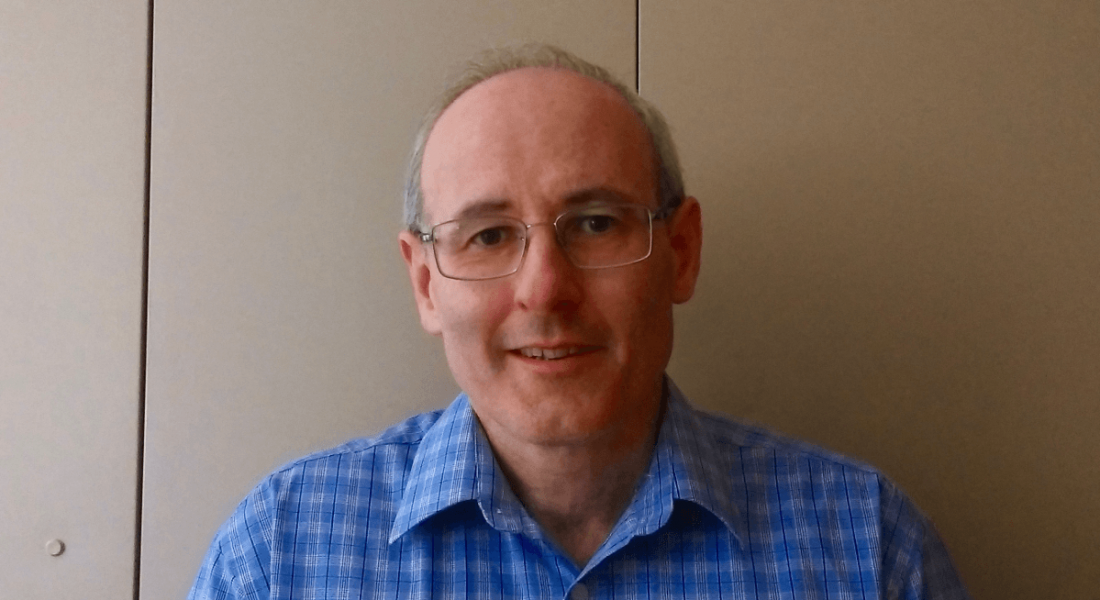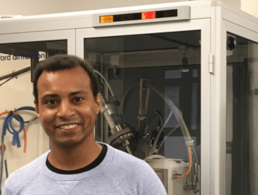For data centres to work to the best of their abilities, a great amount of research has to go into digital communications. But who is behind that research?
A massive part of being a researcher is being able to talk about your research and explain it to those less familiar with the scientific field.
Bernard Butler is a postdoctoral researcher at TSSG at Waterford Institute of Technology, focusing on digital communications.
Here, he talks about his background, his work and what a typical day is like for him as a researcher.
What is your role within TSSG?
I am a postdoc researcher, assigned to the Connect research centre, which is looking at the next generation of digital communications between people, between people and machines, and even between machines.
I supervise PhD students and carry out my own research. The Connect project I work on is concerned with intelligent transport systems (ITS) and is jointly funded by Intel. ITS offers the promise that road transport could be made more energy-efficient and less subject to traffic congestion if we could share information collected by sensors in vehicles and in the roadside infrastructure.
We could then use the information to help drivers make better choices regarding speed, lane changing and avoiding dangers in the road ahead.
Currently, I am off Connect and on a three-month secondment in a large company in the South of France that manages critical IT systems for transport customers. I am looking at how to identify and triage issues in its data centre.
Sometimes, when lots of user requests come in at once, a problem arises and those requests get backed up. The data centre operations staff need to find and fix the problem, otherwise there could be transport chaos for holiday/travel companies and their customers. I bring an alternative perspective and complementary expertise – we learn from each other, so everyone wins!
What education and other positions led you to the role you have now?
I have a BSc, two MScs and a PhD in the areas of computing and applied mathematics/statistics. So, you could say I am drawn to numerate disciplines! Before starting work in WIT, I worked in NPL, the UK’s primary standards and measurement laboratory, where I learned the value of working with data and using mathematical models to understand physical phenomena.
I then worked in a consulting company in Ireland, with clients in telecoms (Vodafone), banking (Bank of Ireland and EBS), insurance (Aviva), retail (Tesco), etc. I advised them on how to build systems to understand how their business was doing, and to develop strategies to increase profitability, reduce risk and/or increase customer satisfaction.
I also took on other positions where I could refine my skills in bringing together computing, mathematics and business. Indeed, without realising it, I became a data scientist long before the term was invented! It was precisely this mix of intellectual curiosity, tempered by the need to build something that works, that led me to my current position as an academic researcher in a research group in WIT (the fact that my wife was from Co Waterford played no part in the choice of location …).
Can you tell us about the research you’re currently working on?
I am looking at data centre operations. Data centres are where computing resources are consolidated in one site. Sometimes, the data centre is operated by a large company such as Google, Amazon or Microsoft on behalf of their customers but, in this example, the travel operations company operates its own data centre on behalf of its customers in the travel industry.
The users are travel agents and the public. When they want to search for flights, hotels and other connections, they need to be able get reliable information quickly. Similarly, when they book a ticket or a room, the booking needs to be processed correctly. There are many moving parts and sometimes they fail; a network link might fail, or software might time out while waiting for partial results to return.
Of course, this data centre has lots of instrumentation and many checkpoints to ensure that all is well. However, occasionally, problems arise and alarms are raised. With an incoming flow of tens of thousands of requests per second, the operations staff need to work quickly to resolve the problem, all while many alarms are going off.
As with all alarm systems, some of them are false and sometimes several alarms go off when really there is just one underlying problem. Therefore, they need a system that can make sense of the situation quickly, by analysing the huge volumes of monitoring data and providing more meaningful alerts so the operations staff can quickly realise what the problem is and are guided to fix the problem.
What first stirred your interest in this area?
As a child, I loved learning about new things by reading books, watching TV, etc. Nowadays, the opportunities are greater, as so much information is available from the web.
However, some information takes more effort to find – a Google search is not enough! If you are a business trying to identify which of your subscribers are likely to switch to another supplier, and how to encourage them to stay, or whether a series of transactions is symptomatic of fraud or money laundering, you need to derive this information from data collected for other purposes.
So, there is still an aspect of curiosity – you need good computer and maths literacy, and the ability to understand the business context, but you are still answering questions.
If there is such a thing, can you describe a typical day for you?
While on secondment, mostly I am learning about data centre operations from the local experts, looking for ways in which to bring my data scientist expertise to bear upon the problem.
Back in WIT, there is no typical day as such. I could be advising students in areas as varied as writing technical papers, prioritising research questions, directing their research and giving feedback on their results. I could also be working on research proposals with other researchers and with industry partners – without funded research proposals, no research work can be done!
Other tasks include participating in the community of researchers: building links with researchers elsewhere, reviewing papers submitted to conferences and journals, and contributing to the development of knowledge and skills in my group and in WIT more generally.
There is also my own research agenda, which is concerned with data science and, more recently, with data security and privacy protection.
Which skills and tools do you use on a daily basis?
Digital communication is at the heart of what I do, but talking and discussion also plays an essential part. For example, when trying to learn about a specific topic – such as data centre operations from the experts – you need to be able to ask the right questions, interpret the answers and, indeed, contribute something of value to the conversation yourself by drawing upon your own expertise.
Other skills include the ability to absorb written information from technical papers, and to be able to write papers, on your own or with others.
Mathematical modelling is essential. You take a complex scenario and boil it down to its most relevant features, which you then express in mathematical form. Often, you are trying to optimise something; find the settings that yield the most desired outcome. At other times, you are trying to see whether something can be found or done, given all the constraints.
Usually, such models need to be applied to data, which can be numeric or textual/conceptual, or a mixture. For data science investigations, I find myself writing scripts using the R language (and its packages) and/or octave, but usually the data needs to be preprocessed using a mixture of languages; from query languages such as SQL and SPARQL, to general purpose languages such as Java, Rust and Python; all held together with scripts using a variety of languages drawn from my (Unix) toolbox, such as bash, sed and awk.
Sometimes, I need to work with domain-specific languages for expressing data in specific formats or for configuring systems such as databases, visualisations, etc.
What applications do you foresee for this research?
The research work I am doing while on secondment will probably not be visible to anybody outside the data centre – but if my work contributes to making the systems there more reliable and better able to handle problems, with less inconvenience and worry for the travelling public, that would be a great result!
My Connect research will hopefully help vehicle manufacturers, their suppliers and transport authorities to make road transport safer (reducing deaths and injuries) and more energy-efficient. The work that we do in our Connect project is just a small part of this; we would be looking at how to make the relevant data flow more smoothly to where it is needed, so that it arrives on time.
Are there any common misconceptions about this area of research?
I suppose the biggest misconception is that users have become complacent about IT systems. Many years of continuous improvement in their experience of such systems probably mean that they expect this to continue indefinitely.
However, systems are becoming more complex, so failures, when they occur, are more difficult to interpret and fix. Ingenious ways have been found to increase data connectivity and bandwidth, but scenarios such as ITS pose challenges because of the rapidly changing context.
Perhaps the best way to address them is to manage expectations, and try to stay ahead of the curve by performing research that can be translated into benefits for society, before the public realises that the need exists.
When you first started work as a researcher, what were you most surprised to learn was important in the role?
I am constantly reminded that research is largely an incremental activity – we truly stand upon the shoulders of giants. Therefore, we need to be able to focus on what the research contribution is. That means being able to identify the state-of-the-art, to identify a research contribution that you and/or your colleagues can make, and then treating the process of undertaking the research itself as a project.
Having worked in both industry and academia, I can see many similarities; the differences are mainly of degree. For example, when working as a consultant, we were guided very much by the client – they identified the research contribution, which would usually be specified in the project objectives. We negotiated with them in relation to the scope, timing, etc.
As an academic researcher, you decide the research contribution yourself, possibly in consultation with partners. Therefore, a focus on objectives, teamwork and good project management is needed in my role, and I have seen this pattern repeat during my career to date.
What do you enjoy most about your career in research?
While there are frustrations and disappointments (such as when a project proposal or a submitted paper is rejected, or a line of research does not yield useful output), there are also successes.
I enjoy learning something new, whether that is a new domain area or even a software tool, or indeed some insight from data. I enjoy working with others – colleagues, students, partners, etc. I derive great personal satisfaction when I can share some knowledge that helps the recipients to achieve something, perhaps with less effort or greater accuracy than would otherwise be the case.
In short, if I can learn something new, and help others while doing so, then I enjoy my work!




